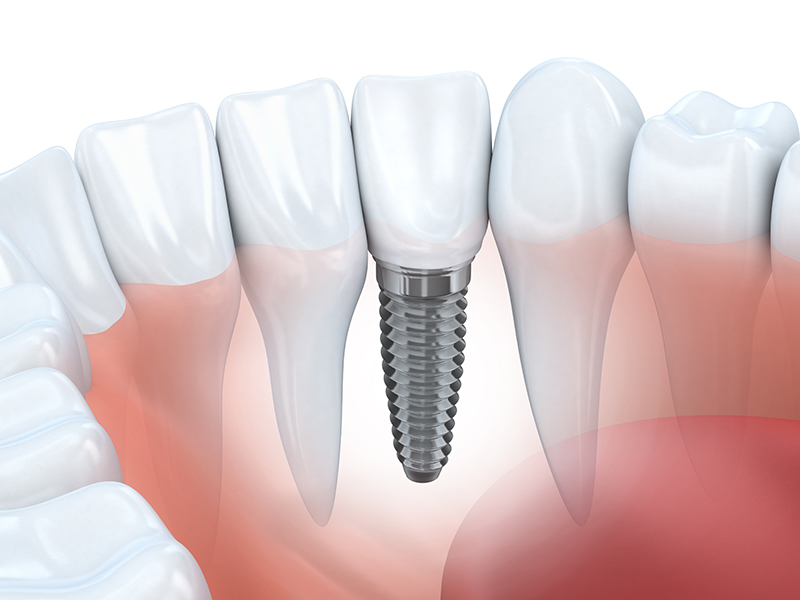Okanagan Periodontics
Treatment of Peri-Implant Diseases (Peri-Implant Mucositis and Peri-Implantitis) In Kelowna
Treatment of Peri-Implant Diseases (Peri-Implant Mucositis and Peri-Implantitis) Near You
Dental implants can make a significant impact on your well-being. Dental implants act like natural tooth roots, providing a sturdy structure for dental device restorations such as dental crowns and dental bridges. Your dental implants can last you a lifetime with proper care and oral hygiene. Yet dental implants can also be affected by gum disease and infections, just like natural teeth. Peri-implant diseases fall into two categories: peri-implant mucositis and peri-implantitis.
Signs of Peri-Implant Diseases
Peri-implant diseases cause inflammatory conditions in the soft tissue and gums surrounding a dental implant. The tell-tale signs that you may be suffering from a peri-implant disease closely resemble the signs of gum disease with natural teeth. Your gums might be red or sore caused by inflammation. You may notice blood in your saliva while brushing your teeth. In severe cases, peri-implant disease can cause bone deterioration below the implant, weakening the tooth structure and loosening the implant. Gum inflammation progresses with warning signs and can be spotted early with routine dental appointments.
What Causes Peri-Implant Diseases?
The causes of peri-implant disease are the same as gum disease around natural teeth. The leading cause is bacteria in the mouth and can be prevented with good oral hygiene. Brushing and flossing your teeth every day paired with professional teeth cleaning helps clear away plaque from your teeth and prevent bacteria from growing in your mouth. Clean teeth can help you avoid infection and inflammation below the gum line.
Peri-Implant Mucositis
Early-stage gum disease located around dental implants is peri-implant mucositis. Your periodontist will determine you have peri-implant mucositis when there is no evidence of bone loss. You will have inflammation in your gums and the soft tissue surrounding your dental implant. In many cases, peri-implant mucositis is a precursor for advanced peri-implantitis. The good news is that when we catch peri-implant mucositis early, it can be successfully treated and reversed.
Peri-Implantitis
When we find advanced-stage gum disease surrounding dental implants, the treatment almost always involves oral surgery. Bacterial infections that seep deep into the gum line can disrupt the soft tissues surrounding the implant. The bacteria also eats away at the supporting bone structure, weakening the dental implant. Periodontal surgery can clean away the infected soft tissues to stop the spread of infection. To fix bone deterioration, surgical procedures such as bone grafting can help repair gaps in the bone.
Who Is at Risk for Peri-Implant Disease?
Anyone with a dental implant can be at risk for peri-implant disease if they neglect to clean plaque from their teeth and mouth. Some individuals are at higher risk of peri-implant illnesses based on genetics, other medical conditions, and lifestyle choices. If you’ve previously had periodontal disease or have a history of poor plaque control, you will be considered a higher risk for peri-implant disease. Individuals with diabetes are also at higher risk for gum infection and peri-implant disease. And individuals who smoke are also at a higher risk.
Preventing Peri-Implant Disease
The best way to prevent peri-implant disease is to be aware of the risks and practice good teeth cleaning habits. Your dental implant is a root replacement and needs to be cleaned and protected just as a natural tooth would. We recommend brushing your teeth twice a day for two minutes, plus daily flossing and using a mouth rinse to help wash away remaining bacteria in the mouth. Keeping routine appointments for dental check-ups and seeing your periodontist for periodontal hygiene cleanings can help prevent the peri-implant disease from starting or preventing it from returning.
Peri-Implant Disease Treatment in Kelowna
If you have dental implants, routine appointments with your general dentist and your periodontist are part of a comprehensive periodontal evaluation strategy. Diagnosing a peri-implant disease early can quickly treat and reverse the condition, protecting your gums, tissue, and bone. If you are suffering from inflamed gums around your dental implant, call our clinic directly for an appointment or ask your dentist for a referral.
Remember

